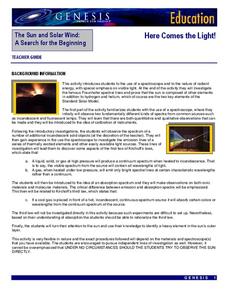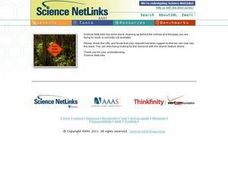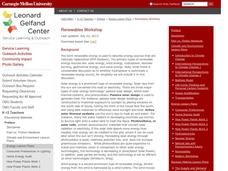Curated OER
Energy Resources: Where Are They and How Do We Get Them?
Future energy engineers visit several stations, each one dedicated to a different alternative source of energy. They describe how solar energy is converted into other forms of energy, the patterns of distribution of energy resources in...
Curated OER
Sources of Energy
Fifth graders take a close look at how energy changes from one form to another within their surroundings. They also study the ten different sources of energy and determine which are renewable and which are non-renewable. This seven-page...
Colorado State University
What's the Difference Between Blue Light and Red Light?
Finally, an electromagnetic spectrum lab that will get glowing reviews from your class! Explore the nature of light using red and blue LED sources and fantastic phosphorescent paper. Young scientists compare the effects of blue light...
Huntington Library
Light in Painting
How do painters use and manipulate light in their artwork to give emphasis and establish mood and emotion? Pupils will analyze a few examples of landscape and portrait painting in order to explore the how light is used in art, and will...
Curated OER
Starlight
An introductory exploration of the nature of light is provided via activities and demonstrations. Science superstars observe various light sources, learn how to apply inverse square law, and practice using a light meter. Follow-up...
NASA
Here Comes the Light!
Look beyond the light! An engaging activity introduces young scholars to the application of a spectroscope. The lesson is the fifth in a series of six and focuses on the analysis of the elements of the sun.
Teach Engineering
Light Intensity Lab
Let there be light. The last installment of a seven-part series has pupils conduct an experiment on light attenuation through different numbers of transparency sheets. They then relate the results back to how X-rays measure bone density.
BBC
Light and Dark
Learners investigate different sources of light. In this light instructional activity, students determine that light occurs naturally as well as with technology created by mankind. Learners work together to identify sources of light....
Curated OER
Natural Disasters
Students create an expressive painting documenting their experience of a storm. They create a slide show presentation comparing and contrasting the impact and the response to a natural disaster in the 19th century with the impact...
Curated OER
Light 3: All Those Seeing Color, Say Eye!
Young scholars explore the nature of light. They use on-line articles and a worksheet to explore the roles of the eye and brain in the perception of color. They draw and label a diagram illustrating the movement of light.
G. Turrell
Science Activity 1: Light & Sound
Are you looking for lab sheets to go with your class experiment on plant response to light? You are no longer in the dark! This is a lesson that was written for a unit on light, but could easily be used to demonstrate plant behaviors in...
Digital Public Library of America
The American Whaling Industry
When thinking about the American whaling industry most imagine Moby Dick and Nantucket sleigh rides, harpoons and scrimshaw, whale-oil lamps and baleen in women's corsets. But it may come as a surprise that the industry was also...
Carnegie Mellon University
Renewables Workshop
Youngsters examine resource maps to find out which states are using solar and wind power and discuss as a class various other renewable energy sources. They use a provided data table to record pros and cons to each technology, build and...
Cold Spring Harbor Laboratory
Some Types of Mutations Are Automatically Repaired
Does natural light damage or repair DNA? Learn the answer discover the scientists who researched the topic with an online interactive. Scholars read through an online animation presenting the content at their own pace. Then, they read...
Carnegie Mellon University
Transportation
Teach your environmental studies, life science, or engineering class how an internal combustion engine works using the first few slides of the accompanying presentation. Then, focus in on the resulting carbon emissions. Finally, take a...
G. Turrell
Science Activity 2: Light & Sound
Little learners experiment with sunlight and map out how light travels. Using a mirror and slotted card, they find out about items that can reflect or absorb the light. They experiment with a variety of materials to find out how light...
Polar Trec
Nature's Density Column
Nature provides density columns in the polar regions that provides food for many animals. Young scientists build their own density columns with water in order to answer analysis questions. Through a slideshow presentation, scholars...
Curated OER
Using Light and Shadow to Create a Sense of Character
Pupils heighten awareness and mastery of the subtle factors of drawing technique. Activities focus solely on the human figure, particularly the face. students list 5 of elements of light and shadow which affect portrayal of character and...
Curated OER
The Technology of Light
Students study the different types of light bulbs. In this exploratory lesson students complete several activities and create an electrical circuit.
Curated OER
School Lighting Audit Preparation
Students work together to develop a school lighting audit plan. They practice using new vocabulary related to an energy audit. They also identify the components of a school lighting audit.
Curated OER
Light 2: The Lighter Side of Color
Young scholars explore light and color, including how colors are mixed to produce new colors, how light is filtered, and how light is reflected off of surfaces.
EngageNY
End of Unit Assessment, Part 2: Research and Response
Talk it out. Scholars complete part two of the assessment by participating in a World Café discussion activity. Learners circulate the room, sharing their ideas and thoughts about Canada's natural resources using quotes and paraphrasing...
Curated OER
Lighting Our Way
Students read a variety of web-based articles to explore the history of human understanding of light. They investigate light waves and read about the work of Albert Einstein.
Curated OER
Light It Up
Young scholars study day-lighting and other types of light bulbs that are used for energy efficiency. In this engineering lesson students study the light bulb parts and the light wavelength.

























